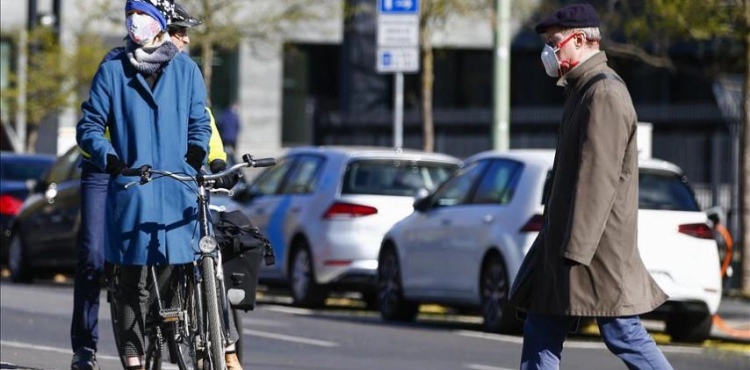Germany announced on Friday that the Covid-19 epidemic is under control after a month of restrictions on social mixing imposed by the authorities and promised to produce protective masks in large quantities a week before starting to gradually reduce isolation measures.
For the first time, data from the Robert Koch Institute for Epidemiological Monitoring showed that every person infected with Covid-19 in the country is now transmitting the infection to less than one person. She noted that the rate of infection with the emerging coronavirus, which causes the epidemic between one person and another, has decreased to 0.7.
German Health Minister Jens Young announced that the new Corona virus is "under control".
"The number of casualties has decreased dramatically, especially the relative increase on a daily basis. The outbreak is now again under control," the minister said.
The transmission rate is a very important indicator, as it affects the health system´s ability to absorb the flow of patients.
In a speech on Wednesday, German Chancellor Angela Merkel warned that any new rise in the infection rate would "plunge" the German health system.
"With an infection rate of 1.1, we will have reached the highest potential of our health system in the area of ​​family and recovery rooms by October, with a rate of 1.2 we reach that in July, and with 1.3 we reach this stage in June," she said. /June".
Without resorting to strict isolation, Germany imposed on all its territories great restrictions from closing schools and cultural centers to preventing the gathering of more than two people.
"We can say now that this worked," German Health Minister said. "We were able to move from an active increase to a stable increase, and infection rates decreased dramatically."
The number of reported injuries officially reached Friday 133,830 cases (+3380 in 24 hours), and 3868 deaths, according to the Robert Koch Institute.
And Germany, which has received in its hospitals tens of French or Italian patients, will be able from now on to ease the restrictions.
From May 4, schools will start reopening their schools, giving priority to students who are taking their exams soon. Shops greater than 800 square meters will be allowed to receive customers again.
However, "this success in stages" remains "fragile", as warned by the German Chancellor, whose popularity peaked after 14 years in power.
Rules that prohibit the gathering of more than two people in public places will continue to apply, except for families whose members live in one house, while large public events will remain prohibited until August 31, with the social distance of one and a half meters being respected.
The German health minister confirmed on Friday that "we must learn to live with the virus."
In order to avoid the virus from re-spreading, Germany will manufacture large quantities of protective masks.
Neither the federal government nor the 16 German provinces followed the model of neighboring Austria that imposed masks in shops and public transportation, contenting itself with a "strong" recommendation to use it.
Thus, the government announced that it had awarded about 50 companies contracts to produce ten million FP2 mask and 40 million surgical mask as of August.
Defending the decision not to impose the mask, youths said people have so far shown "a great responsibility".
But the experience of putting up the masks compulsorily in the city of Enna in the province of Thuringia proved effective, as no injury was recorded in it a week ago, according to the German press.
For its part, Saxony, previously in East Germany, announced Friday that covering the mouth with protective masks or with just a handkerchief or a piece of cloth will be mandatory from Monday. And thus become the first province to take such action.
Germany also intends to intensify the testing of the virus, and has so far conducted about 1.7 million tests.












